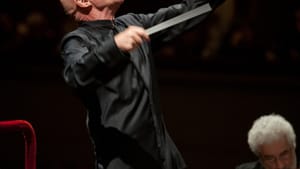Stay in the Loop
BSR publishes on a weekly schedule, with an email newsletter every Wednesday and Thursday morning. There’s no paywall, and subscribing is always free.
Eschenbach returns, Weilerstein shines
Philadelphia Orchestra presents 'Beethoven's Fifth with Eschenbach'

Perhaps former Philadelphia Orchestra music director Christoph Eschenbach was destined to conduct Beethoven’s Fifth Symphony in all its galactic glory. After all, the current head of Konzerthausorchester Berlin bears an astonishing resemblance to Star Trek: The Next Generation’s Captain Jean-Luc Picard (a.k.a. Sir Patrick Stewart).
He did just that this past weekend, preceded by an overall satisfying rendition of two other Romantic works from the German repertoire.
The force is with him
Eschenbach’s tenure (2003-2008) with the Philadelphia Orchestra was marked by controversy and conflict, but that isn’t necessarily bad. Emotions ranging from annoyance to outrage tend to sharpen our senses and quicken our pulses: physiological conditions conducive to keen appreciation and a heightened listening experience.
Love him, hate him, Eschenbach is a force to be reckoned with. That forcefulness was on full display as he led three stirring works: Weber’s Overture to Der Freischütz, Schumann’s Cello Concerto in A minor, and Beethoven’s Fifth Symphony in C minor.
From the onset, it was clear this was not business as usual. Eschenbach restaged the strings, with basses and cellos to the left and center behind the violins. From my vantage point, this resulted in richer, deeper sound, especially warm as it cushioned Alisa Weilerstein’s solo performance in the Schumann.
Weilerstein, one of the preeminent young cellists of this generation, has riveting superstar appeal. Wearing a clingy gold lamé gown with a flowing train, she strode onto the stage, cello in hand, her long brown hair hanging free. Her attitude of genuine interest in her surroundings with a tad of appealing haughtiness provided a context for some spirited, intelligent, and creative playing.

The Schumann is a familiar, much-performed work, but it burst alive with unexpected sparks and insights under the touch of this extraordinary young artist. Playing without a score, her performance flashed with gritty attacks and transcendent runs. It was a cry from the heart, ever honoring the technical demands of a volcanic work that sizzles without interruption from start to finish.
Turn it off
The program began with a fresh performance of Weber’s overture, recalling the mystery, magic, and charm of the German forest and the motives — sinister and pure — of those who inhabit it. The orchestra revealed a wealth of colors and textures throughout this work, with spectacular effects in the horns and clarinet. It was as though they held their collective breath at the fermata before the key change near the end. What a gasp of breath as the work sailed to a triumphant conclusion with these fine musicians and a conductor’s sure touch.
The final selection was Beethoven’s Fifth, a work one can tire of only if it is performed without heart. That certainly was not the case with Eschenbach and the Philadelphians. Whatever conflicts may have colored their relationship in the past, they came together as one for a sublime rendition.
The first four notes, key to any performance, shot out assertively, launching the work through a never-flagging display of energy and aspiration. The progress of the third movement’s whisper to the fortissimo of the fourth was as good as it gets (despite Beethoven’s direction, you could make that fff and I wouldn’t mind a bit).
I am glad Eschenbach had the grace to ignore several cellphones that went off during the concert. The orchestra generally can be counted on to overshadow a ringtone, so rather than turn and give the audience the evil eye, it’s better to stay calm and carry on. I counted four separate cellphone rings during this concert, plus several comments by a young child — which I didn’t mind so much, since children are the future of classical music. Please, music lovers, turn off the phone. It’s easy to do, and I thank you in advance.
What, When, Where
Beethoven's Fifth with Eschenbach. Christoph Eschenbach, condutor; Alisa Weilerstein, cello. Carl Maria von Weber, Overture to Der Freischütz; Robert Schumann, Cello Concerto in A minor, Op. 129; Ludwig van Beethoven, Symphony No. 5 in C minor, Op. 67. Philadelphia Orchestra. February 1-3, 2018, at the Kimmel Center's Verizon Hall, 300 S. Broad Street, Philadelphia. (215) 893-1999 or philorch.org.
Sign up for our newsletter
All of the week's new articles, all in one place. Sign up for the free weekly BSR newsletters, and don't miss a conversation.

 Linda Holt
Linda Holt